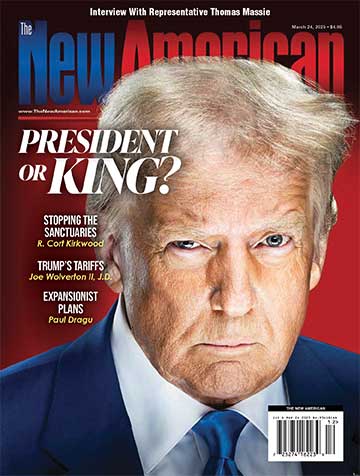
Senate Majority Leader Mitch McConnell said Tuesday that senators will be back in Washington, D.C., on December 29 to attempt to override a potential veto from President Trump on the National Defense Authorization Act (NDAA).
On the Senate floor, McConnell declared that he had reached a deal with Senate Minority Leader Chuck Schumer (D-N.Y.) to have members of the chamber return to the nation’s capital for a rare post-Christmas session in which they will “process” a veto override if one is passed by the House of Representatives.
“My intention was and is to ensure the Senate continues fulfilling our obligation to the men and women of our armed forces. I hope the president will not veto this bill,” said the majority leader.
“In the event that President Trump does elect to veto this bipartisan bill, it appears the House may choose to return after the holidays to set up a vote to consider the veto…. In the event that the president has vetoed the bill, and the House has voted to override the veto, the Senate would have the opportunity to process a veto override at that time,” McConnell added.
If the Senate reconvenes at the end of December, it could still take days before a final vote takes place on whether to override a veto from the president on the massive defense bill.
The deal between the two chambers comes after the House determined on Monday that it would return to D.C. on December 28 for a veto override vote. Of the eight vetoes President Trump has issued during his term in office, none of them have successfully been overridden.
Because it was the House that first passed the defense bill, it must also be the first to make an override attempt.
According to The Hill, a Democrat House aide said that to overcome procedural snags in the Senate, members would have to vote to send the veto message across the Capitol by December 29. If the House is unable to override the veto, the effort is automatically dead.
Leaders in the Senate are likely to face procedural hurdles of their own to get to a final vote on whether to override a veto from President Trump.
Senators who oppose an override could, for example, drag out the procedure by forcing a cloture vote, thereby requiring the override effort to initially get 60 votes. Successfully overriding the president’s veto ultimately would require a two-thirds vote in each chamber.
Republican senators have previously suggested that they could wait to hold a final vote until January 3, before the new Congress is sworn in. Senate Majority Whip John Thune (R-S.D.), the chamber’s No. 2 Republican, warned on Monday night that it could take a “few days” for the Senate to go through all of the legislative hurdles.
“It will take more than one day if we have objections and I think we probably will. So the question is, if the House, if they override it, then … we’ll have to set it up, and it may take a few days to do that,” Thune said.
Senator Rand Paul (R-K.Y.) intimated Monday that he could similarly delay an override vote.
“I very much am opposed to the Afghan war, and I’ve told them I’ll come back to try to prevent them from easily overriding the president’s veto,” Paul told reporters.
The deadline for Congress to override the veto is noon on January 3. If they are unable to do so by then, the bill would be dead and lawmakers would have to start from scratch on the defense bill. It would be the first time in 60 years that the National Defense Authorization Act (NDAA) does not become law.
President Trump has vowed to issue a veto unless the legislation includes a repeal of Section 230 of the 1996 Communications Decency Act, which currently protects the big social-media platforms from liability for content posted on them.
The president and other detractors of Big Tech argue that these corporations should lose this protection because, in constantly censoring user content, they are behaving mores as publishers (which are liable for the content they publish) than neutral platforms.
In addition, President Trump wants the defense bill to include language that rename military bases that honor Confederate figures, several of whose names have been changed due to political correctness.
“I will Veto the Defense Bill, which will make China very unhappy,” Trump tweeted last Thursday. “They love it. Must have Section 230 termination, protect our National Monuments and allow for removal of military from far away, and very unappreciative, lands. Thank you!”
The president has until Wednesday to veto the bill, which was passed with veto-proof majorities in both chambers.





